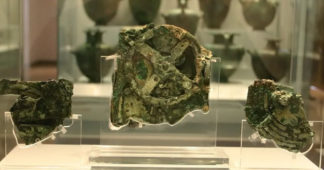Oct. 17, 2021
A new book titled “Antikythera Mechanism: The Story Behind the Genius of the Greek Computer and Its Demise” by Greek historian and ecopolitical theorist Evaggelos Vallianatos seeks to unravel the mystery of the world’s first computer.
In the book, Vallianatos argues that ancient Greeks made incredible advancements in science, technology, and culture in the fourth century BC after Alexander the Great conquered Persia.
This period of amazing growth and development continued throughout ancient Greek history, and the astounding Antikythera Mechanism, which was used as an astronomical computer, was created during this incredible period.
World’s first computer used to predict astronomical events
Most likely built on the island of Rhodes in the second century BC, the Antikythera Mechanism was likely used for a variety of astronomical purposes, including to predict lunar and solar eclipses, to calculate the places of stars and constellations in the sky, and to chart the movement of the planets around the sun.
This hand-powered, many-geared device was extremely sophisticated, and the information it provided was essential to creating an accurate calendar that linked astronomical events to religious and athlete festivals, such as the Olympics and spiritual events.
In his book, Vallianatos argues that only during this period of flourishing science and culture could such an incredible invention be created, and that only after the arrival of Christianity in Greece could such advancements and knowledge be destroyed.
Book provides new perspective on Antikythera Mechanism
Vallianatos argues that Christianity destroyed what could have been an exciting computer age in ancient Greece.
Rober Garland, Professor of Classics at Colgate University, reflected on this argument, writing:
“I find Dr. Vallianatos’ writing vivacious, engaging, and at times passionate. His thesis that it was Christianity that brought to an end ancient Greece’s nascent computer age will certainly raise a few eyebrows but might also stimulate a lively debate. It is commendable that he takes pains to situate the instrument [Computer / the Tablet] within the context of Greek civilization.”
Not only does the book explore the uses and features of the incredible computer, but it also examines the specific cultural and historic context during which it was created, providing further insight into the mysterious object that has amazed scientists and archaeologist alike for decades.
Sir John Boardman, Lincoln Professor Emeritus of Classical Archaeology at Oxford University, praised the book, stating “The Antikythera ‘computer’ has long puzzled classical scholars who had no suspicion of Greek prowess in this field. It has also proved a puzzle for computer experts. Vallianatos has new observations to make about it, based on very close study of its manufacture and inscriptions. [His book] is a signal contribution to classical, mathematical and historical studies.”
Evaggelos Vallianatos, Ph.D., teaches at California State Polytechnic University, Pomona. He is the author of hundreds of articles and six books. He studied zoology and history at the University of Illinois and received a doctorate in History from the University of Wisconsin.
We remind our readers that publication of articles on our site does not mean that we agree with what is written. Our policy is to publish anything which we consider of interest, so as to assist our readers in forming their opinions. Sometimes we even publish articles with which we totally disagree, since we believe it is important for our readers to be informed on as wide a spectrum of views as possible.











